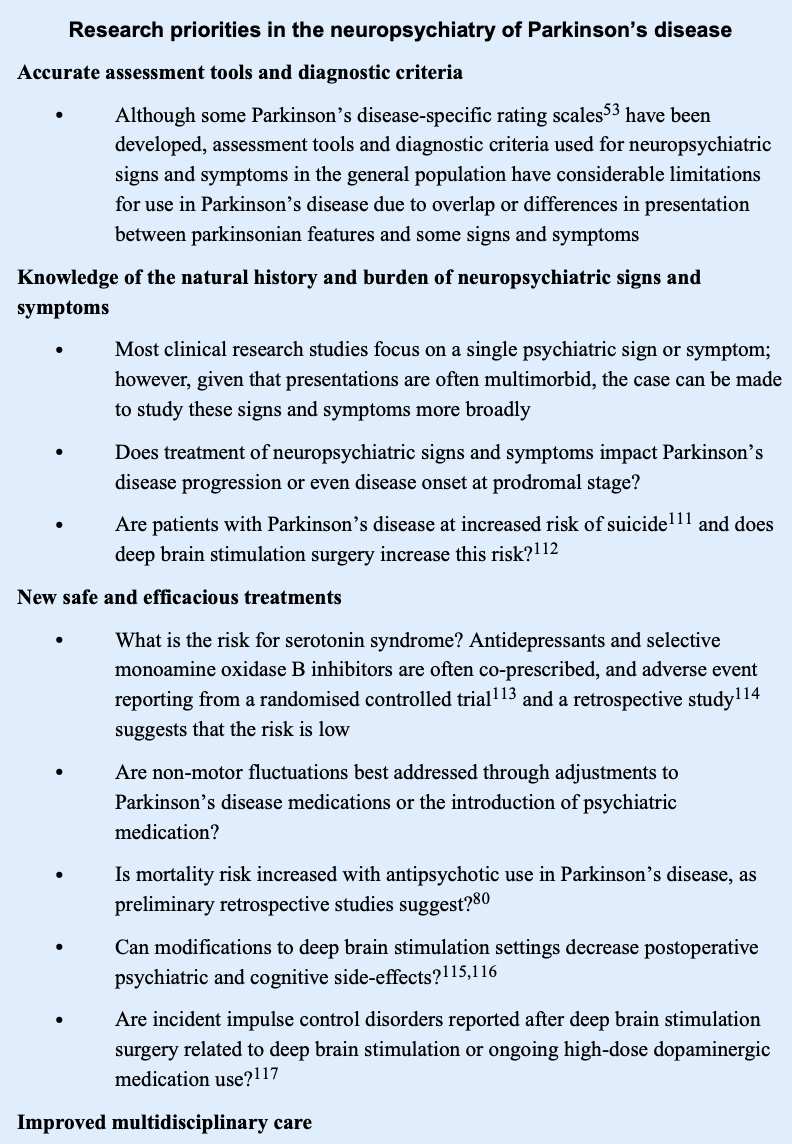Surprising insights into neuropsychiatric Parkinson's disease symptoms
This month a great article was published in Lancet Neurology by Dan Weintraub and colleagues on the neuropsychiatry of Parkinson’s disease: advances and challenges. In this week’s parkinsonsecrets.com blog we will feature some of the provocative and thought-provoking ideas in the article.
Why are neuropsychiatric Parkinson’s disease symptoms so important to study?
I have three words for anyone reading this blog, “they are common.”
“Evidence, mostly from cross-sectional studies and increasingly from longitudinal studies, shows that the prevalence and severity of these neuropsychiatric signs and symptoms often increase over time, that they can present in isolation but are frequently multi-morbid, and that their etiology is complex.
Are all neuropsychiatric symptoms equal across cases with Parkinson’s?
No. “There is a large inter-individual variation in the frequency, time of onset, and severity of neuropsychiatric signs and symptoms in patients with Parkinson’s disease.” Parkinson’s may be the most complex disease in medicine when you consider all the motor and non-motor symptoms. Every person with Parkinson is different.
Should we be classifying symptoms as dopaminergic or non-dopaminergic?
On the surface the answer to this question seems to be “yes.” However like Lee Corso says on ESPN Gameday, “not so fast.” Weintraub and colleagues argue that it is "Unclear whether classifying PD signs/symptoms as dopaminergic versus non-dopaminergic is actually valuable for clinical/research purposes; features considered at opposite ends of the spectrum overlap.” Think of for example apathy and depression; or how about apathy and impulse control disorder. We now know these can co-occur in PD folks.
Does Parkinson’s disease depression only occur in late disease stages?
No. "Parkinson's disease depression and anxiety can occur at any disease stage." In fact depression can be the presenting symptom in some cases of Parkinson’s disease.
Can hallucinations occur early in Parkinson’s?
It turns out the answer is “yes.” Weintraub and colleagues write that "minor hallucinations (ie, passage and presence phenomena and illusions) can occur in EARLY PD and that non-visual hallucinations are also common." This means that we should not always jump to a diagnosis of Lewy Body Dementia with early hallucinations.
What is a huge challenge in studying neuropsychiatric signs and symptoms in Parkinson’s?
Parkinson’s disease is really as Bas Bloem likes to say, Parkinson’s diseases. There exists, "large inter-individual variation in the frequency, onset time , and severity of neuropsychiatric signs/symptoms in persons with Parkinson’s disease." This is amaybe the greatest challenge facing research in PD neuropsychiatric symptoms.
What do Weintraub et. al. think are some of the important research priorities in Parkinson’s disease?
Information drawn from public access article: Lancet Neurology by Dan Weintraub and colleagues on the neuropsychiatry of Parkinson’s disease: advances and challenges.
To read more books and articles by Michael S. Okun MD check on Twitter @MichaelOkun and these websites with blogs and information on his books and http://parkinsonsecrets.com/ #Livingwith Parkinson’s #EndingPD #Parkinsonsecrets #LessonsFromTheBedside
He also serves as the Medical Advisor for the Parkinson’s Foundation.
To see more on Dr. Indu Subramanian she does live interviews of experts in Parkinson’s for the PMD Alliance.






